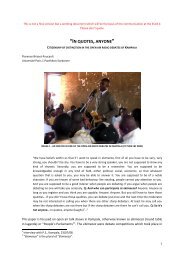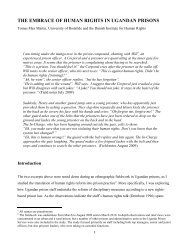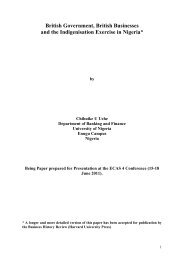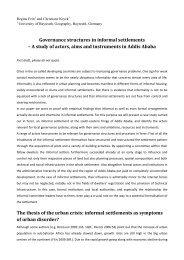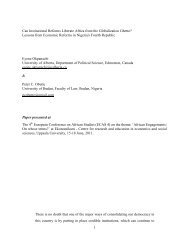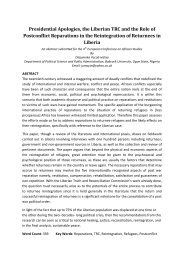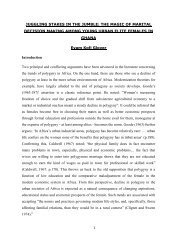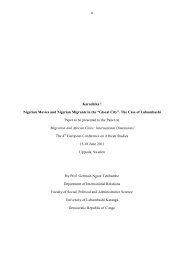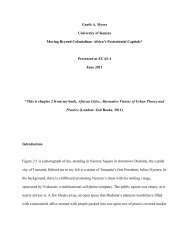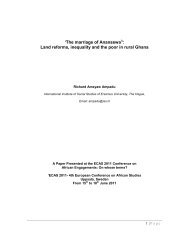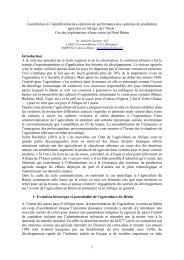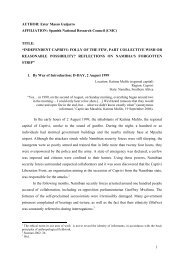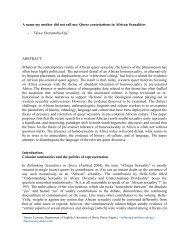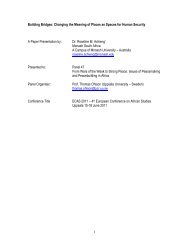Anne-Sophie Beckedorf - Full paper - The Nordic Africa Institute
Anne-Sophie Beckedorf - Full paper - The Nordic Africa Institute
Anne-Sophie Beckedorf - Full paper - The Nordic Africa Institute
You also want an ePaper? Increase the reach of your titles
YUMPU automatically turns print PDFs into web optimized ePapers that Google loves.
Governmentalizing water privatization: the case of<br />
Khartoum<br />
<strong>Anne</strong>-<strong>Sophie</strong> <strong>Beckedorf</strong>, University of Bayreuth 1<br />
Abstract<br />
Since 2001, privatization trends were introduced to Khartoum governmental water<br />
management. Consequently, several parts of the governmental water supply system,<br />
such as water fee collection, water network construction and water treatment plant<br />
operation, were in recent years outsourced to private companies. <strong>The</strong> process of<br />
outsourcing was thereby accompanied by political, economic and/or clientele<br />
relationships between some members of the responsible governmental staff and the<br />
newly established private companies, which were in most cases closely affiliated to<br />
the government. Instead of enhancing the efficiency of governmental water supply in<br />
Khartoum, an uncontrolled implementation of privatization thus led to an increase of<br />
corruptive practices and mismanagement in governmental water supply. Rather than<br />
leading to a retreat of the state or to an advance of the market, privatization at<br />
Khartoum governmental water management was ‘governmentalized’ and led to what<br />
might be called ‘governmental-private-continuum’. Furthermore, arguing that water is<br />
essential for life, privatization trends in water management were at the same time not<br />
appreciated by several governmental employees and thus remained generally<br />
contested. In sum, the case of Khartoum demonstrates that the relationships<br />
between ‘the public’ and the ‘private’ are continuously reshuffled according to<br />
political, economic and clientele dynamics and therefore need to be reconsidered in<br />
an integrated manner.<br />
1 <strong>Anne</strong>-<strong>Sophie</strong>.<strong>Beckedorf</strong>@uni-bayreuth.de<br />
1
Introduction: the rise of water privatization<br />
In the framework of a global neoliberal agenda which assumed that “less government<br />
is good government” (Moore 1986a: 93) and that the free play of market forces<br />
constitutes the solution to government failures, various privatization programs have<br />
been enhanced in most sectors – including the water sector – since the 1980s<br />
(Pitelis/Clarke 1993: 1). Water sector privatization can be defined as “transfer of<br />
ownership of water supply systems to private companies” (Bakker 2007: 437). Such a<br />
transfer of ownership can thereby be carried out at different degrees, ranging from<br />
full privatization to public-private partnerships, which play a particularly important role<br />
in outsourcing specific parts of water management (Castro 2008: 65). 2 In the 1990s,<br />
water privatization was increasingly regarded as a means to enhance water supply<br />
as it was regarded to be client-oriented, to facilitate private capital, to dispose of<br />
fundraising and investment mechanisms into water infrastructure despite public<br />
deficits, to increase the connection rates and to thus particularly benefits the poorer<br />
water consumers who are otherwise furnished by expensive private water vendors,<br />
and to enhance cost-recovery water prices 3 which enhance the consciousness of<br />
water scarcity and which stimulate an ecologically sound water use (Dobner 2010:<br />
135 ff.; Hemson 2008: 33). Consequently, starting with England and Wales in 1989 4 ,<br />
the privatization of urban governmental water management has become a global<br />
phenomenon which is enhanced by development cooperation, international<br />
organizations and globally acting companies (Bakker 2003b: 7).<br />
2<br />
Contract forms of public-private partnerships in water supply are for example (McDonald/Ruiters<br />
2005b: 16): service contracts (public authority remains responsible for operation and maintenance, but<br />
outsources specific services, such as billing), management contracts (public authority remains<br />
responsible for monitoring new investment, contractor operates and maintains the water<br />
infrastructure), lease (public authority transfers complete responsibility for operation and maintenance<br />
to the lessor, who rents the facility), different characteristics of “BOO/BOOT/BOTT (Build, Own,<br />
Operate, Train, Transfer: the contractor builds, owns and/or operates a new water system, such as a<br />
water treatment plant, and then transfers the facility after a predetermined time to the public authority),<br />
concession contracts (public authority transfers complete water service system, including operation,<br />
maintenance, management, capital investments, tariff collection, and customer service, to the<br />
concessionaire for the concession period), or divestiture (private operator has full ownership of the<br />
water utility).<br />
3<br />
Although cost recovery pricing does not inevitably entail privatization, privatization on the other hand<br />
necessarily entails cost recovery (or profit) pricing, as water services are only profitable for the private<br />
sector if they are fully paid (Dobner 2010: 136).<br />
4<br />
In the British model of water privatization, entire governmental water systems (water collection, water<br />
treatment, water networks) were sold to private firms. Monitoring and regulation thereby remained a<br />
responsibility of the state. Thus, the British “Office of Water Services” (Ofwat) is responsible for a good<br />
quality service of water provision at a fair price. Ofwat therefore monitors water companies and<br />
economically regulates the water industry in England and Wales. See http://www.ofwat.gov.uk/,<br />
accessed on 14/1/11.<br />
2
At the same time, the promotion of water privatization has also provoked many<br />
criticisms. It is thus argued that instead of considering water as a private commodity<br />
and basic need which is best provided by private sector investment, water should<br />
rather be considered as a public service and basic human right, which has to be<br />
supplied without concession (Dubash 2004: 220; Vincent 2003: 133; Hemson 2008:<br />
30). Critical views on water privatization further argue that private water providers are<br />
not necessarily more efficient; that through cherry-picking, international water<br />
companies benefit most of water privatization, while remote water consumers do not<br />
get access to improved water provision; that private water contracts are<br />
governmentally secured and that in consequence, investment risks are not taken by<br />
the private water company, but by the public expenditure; that private water providers<br />
deteriorate water services due to the primacy of profitability; that water prices<br />
excessively rise due to private sector involvement; that the staffing level of private<br />
water provision is inadequate (Dobner 2010: 135 ff.; Swyngedouw 2005: 95; Castro<br />
2008: 67; Bakker 2009: 95; Bouguerra 2006: 105; 120). In this direction, numerous<br />
academic works highlight the negative impacts of privatizing water management (see<br />
for example: Bond 2003; Kaika 2003; Mansfield 2004a; Mansfield 2004b; Dubash<br />
2004; Loftus 2006; Castro 2008; Hall et al. 2005; Hall/Lobina 2007; Hall/Lobina 2008;<br />
Jaglin 2002; Jaglin 2005; Page 2005; Leitner et al. 2007; Jaglin/Zérah 2010;<br />
McDonald/Ruiters 2005; Swyngedouw 2004a; Swyngedouw 2004b; Swyngedouw<br />
2005; Loftus 2006; Davis 2005; Prasad 2006; Bakker 2003a; Bakker 2003b; Bakker<br />
2005; Bakker 2007). 5<br />
5<br />
Thus, Bond (2003: 37) states that through water privatization, most benefits of public water supply<br />
are generally lost. Kaika (2003) analyzes how water scarcity was discursively constructed by the<br />
Greek government in order to assert privatization policies. Mansfield (2004a) examines contradictions<br />
of neoliberal regulation in North Pacific fisheries. Loftus (2006: 1023) conceptualizes the introduction<br />
of water meters as a “dictatorship”. Castro (2008: 67; 74-75) notices that “the poor have been<br />
adversely affected” by neoliberal water and sanitation policies, which have contributed to “the already<br />
worsening patterns of socio-economic inequality” and to “the mushrooming of public protest, civil<br />
disobedience, and even open violence against these policies”. In a similar perspective, Hall et al.<br />
(2005), Hall/Lobina (2007), Jaglin (2002; 2005), Page (2005) and Leitner et al. (2007) highlight<br />
movements of public resistance against the “neoliberalization” of water supply. Furthermore,<br />
Hall/Lobina (2008: 97) emphasize the advantages of public sector water supply in comparison to the<br />
private sector, which is prone to produce an “inefficient network around a monopolistic hub” and to<br />
thus exert control over knowledge distribution. In addition, Jaglin/Zérah (2010: 12) notice that publicprivate<br />
partnerships are “failed models” in water supply. Moreover, McDonald/Ruiters (2005b: 31)<br />
consider water privatization as a global “response to the pressures of an ever-expanding marketization<br />
of social relations under capitalism”. 5 Likewise, Swyngedouw (2004a: 14; 24) regards water<br />
privatization as a tool for turning water into capital and profit which exclusively serves the promoters of<br />
privatization. Referring to the British case, Swyngedouw (2004a: 16) thus states that while non-paying<br />
3
In line with these growing critiques on privatization, nearly half of the private sector<br />
contracts in water supply were in recent years either recalled or faced serious<br />
operational problems (Lobina/Hall 2008: 88; Dobner 2010: 142). After a period of<br />
global investment, activities of the major international water companies, such as<br />
SUEZ Environment and Veolia Environment, have thus recently again diminished in<br />
most development countries (Lobina et al. 2003: 2; Bakker 2009: 94). With less than<br />
ten percent in the last decade, private sector involvement in water provision has<br />
remained relatively low, and private sector water companies have currently got rather<br />
less than more interested in being involved (Mitlin 2008: 33; Lobina/Hall 2008: 88;<br />
Verdeil 2010: 101). However, despite a recent decline of private company<br />
involvement in water provision, privatization policies continue to play an extraordinary<br />
important role for the water sector. Thus, as Castro (2008: 74) outlines, the<br />
“transformations set in motion since the 1980s underpin the continuation of the<br />
neoliberal [privatization] programme (...) either openly and unchanged, or refashioned<br />
and renamed”. Furthermore, England/Ward (2007b: 260) notice that neoliberal<br />
concepts continue to “cast a long shadow” and thus pursue to be of particular<br />
relevance. Moreover, Dobner (2010: 142) notices that a public securing of investment<br />
and currency risks or improvements of the water fee collection rates might soon<br />
initiate a renewal of private investments into water supply. Likewise, Hemson (2008:<br />
34) notices that “there are currently attempts to encourage private involvement<br />
through bilateral trade negotiations”. Hence, privatization remains a highly important<br />
contemporary topic for current water management in most countries.<br />
households were cut off from water supply, the companies and their shareholders “gained<br />
considerable profits”.<br />
4
Privatizing Khartoum governmental water management<br />
Introducing trends towards privatization<br />
In the Sudanese capital of Khartoum, water privatization was introduced in the last<br />
decade. Trends towards water privatization were thereby in line with Sudanese<br />
privatization policies, which were initiated by the Numeri Government in the 1980s<br />
and which were then further pursued by the current El Bashir Government via the<br />
“Sudanese Structural Adjustment Policies” of 1990. 6 <strong>The</strong>se adjustment policies were<br />
part of the new Economic Salvation Program from 1990 to 1993, which was carried<br />
out without any involvement of international financial organizations, such as the<br />
World Bank and the IMF. 7 In fact, the Sudanese Structural Adjustment Policies were<br />
even harsher than the standard adjustment policies proposed by the IMF and the<br />
World Bank in other <strong>Africa</strong>n countries (Musa 2000a: 46). One major actor of<br />
privatization policies in Sudan was the former Sudanese Federal Minister of Finance,<br />
who had worked in an international bank in London in the 1980s and who had<br />
therefore closely followed the privatization policies of Margaret Thatcher. Coming<br />
back to Khartoum in 1990, he carried out privatization policies in Sudan according to<br />
the British model. <strong>The</strong> former Federal Minister of Finance thus states:<br />
M 8 : This [privatization] was my initiative. I was actually in England in the 80ies. And before that I was<br />
working in the Arab bank, establishment of the Arab bank there. So I followed experience of<br />
privatization and so on.<br />
I: You were in London at that time?<br />
6 In the beginning of the 1980s, the Sudanese economy was highly indebted. In order to reduce the<br />
debt and to slim down the public sector, the IMF and the World Bank therefore pushed for a<br />
“Stabilization Plan” which involved currency devaluation, a removal of governmental subsidies and a<br />
liberalization of the economy (Ahmad/El Batthani 1995: 204). <strong>The</strong> Numeri government accepted the<br />
plan and followed the strategy recommended by the IMF and the World Bank from 1978 to 1985.<br />
Accordingly, imports were liberalized, expenditure was cut and the currency was devalued (Musa<br />
2000a: 46). However, the liberalization policy in the 1980s entailed huge differences in income<br />
distribution (Ahmad/El Batthani 1995: 204). <strong>The</strong> World Bank and IMF strategy further involved the<br />
enactment of an Encouragement of the Investment Act, which was launched by the Numeri<br />
government in 1980. As a consequence, the private sector grew rapidly (Musa 2000a: 42). Islamic<br />
banks which increasingly became operative in Sudan since 1978 were thereby acting as the major<br />
organizers of the economy and enjoyed relative autonomy (Simone 1994: 37).<br />
7 Interview with the former Federal Minister of Finance, 8/2/10; interview with the former Federal<br />
Minister of Irrigation and Water Resources, 1/11/09. In 1990, the World Bank and the IMF had<br />
terminated any activities in Sudan and had accorded a noncooperation status to Sudan (Simone 1994:<br />
39). While in 2010, North Sudan was for political reasons not yet fully eligible to any World Bank or<br />
IMF lending program, the relationships have in the meantime however been partially normalized.<br />
8 Interview with the former Federal Minister of Finance, 8/2/10.<br />
5
M: Yes, in London I work at Baraka International Bank. Consultant at Baraka International Bank. So<br />
when you are in London you are in the centre, you can follow the world, not from this far end of the<br />
world here. You are not that planned in Khartoum. In London I closely followed the British privatization.<br />
And it shaped me a lot.<br />
Accordingly, the Economic Salvation Program radically promoted privatization, which<br />
was considered as the key policy instrument for economic growth and efficiency<br />
(O‟Ballance 2000: 173). 9 Furthermore, privatization was regarded as one means to<br />
reduce the growing governmental budget shortages and to attract investments and<br />
foreign capital, mainly from Arab countries. 10 In the framework of these general<br />
policies, trends towards privatization were also introduced to the Khartoum State<br />
Water Corporation (KSWC), the main body responsible for water management in<br />
Khartoum.<br />
Introducing privatization to KSWC<br />
First voices to introduce privatization to KSWC started to be raised in the 1990s.<br />
While the KSWC General Manager at that time was reluctant against the introduction<br />
of privatization trends, this changed when a new KSWC General Manager was<br />
appointed in 2001. 11 This new – and third – KSWC General Manager was among<br />
other factors appointed due to his prior work in the private sector in Saudi Arabia in<br />
the 1980s, where he had worked after his studies of business administration at an<br />
American university. When the third KSWC General Manager came back to<br />
Khartoum in the 1990s, he worked until his assignment at KSWC in 2001 as a<br />
director of a governmental company for water manufacturing, which was being<br />
transformed to a private sector company. 12 <strong>The</strong> application of new investment<br />
strategies enhanced by the third KSWC General Manager made the transformation of<br />
9<br />
In 1990, a new Investment Code was launched, which further enhanced privatization in most<br />
economic domains (Musa 2000a: 42).<br />
10<br />
Interview with the former Federal Minister of Finance, 8/2/10. In the beginning of the 1990s, the<br />
Sudanese economy faced huge economic problems due to several natural disasters, such as drought<br />
and floods, and due to severe political events, such as the continuous war in South Sudan. <strong>The</strong> former<br />
Federal Minister of Finance (interview, 8/2/10) therefore highlights the pragmatic, non-ideological<br />
character of Sudanese privatization policies, which were “carried out of dare necessity”.<br />
11<br />
Interview with the second KSWC General Manager, 2/3/10.<br />
12<br />
This company had before been a department of the Ministry of Irrigation and Water Resources until<br />
the beginning of the 1990s. In the framework of the 1994 Water Sector Reform, water manufacturing<br />
was outsourced to a governmental company, which should then be transformed to a private sector<br />
company.<br />
6
the company for water manufacturing rather successful. 13 When the third KSWC<br />
General Manager was appointed to KSWC, he thus brought with him experience in<br />
transforming public entities to private companies, which he used in order to carry out<br />
similar reform processes within KSWC. As the third KSWC General Manager<br />
mentions in the following extract, he put strong emphasis on that KSWC employees<br />
should shift their focus from the governmental sector to the private sector. Rather<br />
than as an employer, the government should be considered as a water consumer<br />
who pays for the KSWC services in the same way as other consumers do. This new<br />
private sector friendly approach constitutes radical shift within KSWC.<br />
GM 14 : <strong>The</strong> first thing I told the workers [at KSWC]: we are not a governmental. We have to give a<br />
service to the consumers. For this the consumers are paying us not the government. Also the<br />
government is for us a consumer. Our salary is coming from those who we are giving service. Either<br />
the government or commercial or personal, they are paying for us our service. So you have to respect<br />
them. Because they are paying you a salary. So we start. This is why when I said this is my idea to the<br />
government, they [Khartoum State Government] said ok, I give you full authority.<br />
<strong>The</strong> private sector friendly attitude of the third KSWC General Manager thereby<br />
corresponded with the attitude of the new Khartoum State Government at that time 15 ,<br />
which was rather reluctant to pay money for KSWC water projects and which<br />
increasingly expected KSWC to raise the efficiency of water management and to get<br />
involved in raising money from private banks. <strong>The</strong> new Khartoum State Government<br />
thus considered KSWC as a private company and which was itself fully responsible<br />
for the acquisition of funds for water projects. As the following interview extract<br />
outlines:<br />
GM: 16 And I remember in the meeting, (...) at that time [about 2001] they changed the governor. (...)<br />
And when we talk about this plan and we need that money, I find in the budget the Khartoum State<br />
they are putting that the Minister of Finance will pay 600.000 SDG to change the Moghran water<br />
13 Interview with MH, 20/10/09; interview with former Federal Minister of Irrigation and Water<br />
Resources, 1/11/09. From three companies which had been outsourced from the Ministry of Irrigation<br />
and Water Resources (company for drilling, for surface water development and for water<br />
manufacturing), the company for water manufacturing is the only one that is until now operative.<br />
14 Interview with the third KSWC General Manager, 9/3/10.<br />
15 <strong>The</strong> Khartoum State Governor from 2001 to 2009 was generally considered as private sector<br />
friendly. In 2009, he became Federal Minister of Agriculture. Interview with Khalid Ali Khalid, 26/1/10;<br />
interview with Dr. Ahmad Adam, 28/9/10.<br />
16 Interview with the third KSWC General Manager, 26/1/10.<br />
7
pumps. And the new Khartoum State Governor talked to the minister. Do not pay any money to<br />
Khartoum State, he said. And they are astonished. All the ministers are astonished. I'm attending that<br />
meeting, after they have approved our plan. <strong>The</strong>n he told them: I have been working in Red Sea State<br />
and after they retired me there I came and I stayed in my apartment here. For five years, no one from<br />
Khartoum State came and told me: This is your bill, please pay. So, we will not pay anything to them<br />
unless they go and find a way to collect their dues and to scatter their invoices and to send out. And<br />
so we have no money for them. I said okay, thank you. I left the meeting and directly after the meeting<br />
we go to the bank and arrange with the bank how to find out, to change the pumps and we changed<br />
the pumps.<br />
This shift from a governmental water corporation headed by the Khartoum State<br />
Government to a governmental water corporation which becomes increasingly similar<br />
to a private sector company is further highlighted in the KSWC Law of 1995 which<br />
was amended in 2002. This law (referred to as 2002 KSWC Law in the following)<br />
defines the main objectives of KSWC, which are: 17<br />
(A) To exploit the drinking water sources available in Khartoum State in order to secure the need for<br />
pure drinking water of people, animals and the different other aspects of usage.<br />
(B) To provide water services to the consumers in all Khartoum State in coordination with the<br />
relevant authorities.<br />
(C) To manage its business and affairs efficiently on the basis of cost recovery in operation and<br />
maintenance, rehabilitation and development.<br />
<strong>The</strong> aspect of cost recovery and efficiency is further outlined in the section about the<br />
KSWC authorities, which notices that KSWC is entitled “to invest its funds and assets<br />
in any appropriate way of investment in order to enhance and consolidate its financial<br />
standing and increase its revenues” and “to borrow any funds from banks, financial<br />
institutions or any other body inside the Sudan in order to realize its objects.” 18 <strong>The</strong><br />
2002 KSWC Law is thereby in line with the 2005 Khartoum State Interim Constitution,<br />
which clearly refers to the “encouragement of the free market”. 19 Furthermore, cost<br />
recovery, profit making and competitive commercial activity are directly addressed in<br />
the 2009 Khartoum State Corporations Organization Ordinance: 20<br />
17<br />
2002 KSWC Law, article 5.<br />
18<br />
2002 KSWC Law, article 6.<br />
19<br />
2005 Khartoum State Interim Constitution, chapter 2, article 8).<br />
20<br />
2009 Khartoum State Corporations‟ Organization Ordinance, article 5. According to this ordinance,<br />
the Khartoum State Corporations are thus required to generate profit like a private company. In<br />
8
Each corporation shall have, in addition to the objectives contained in its establishment order, the<br />
following objectives:<br />
a. Confirmation of the prime role of the corporation in supporting the Khartoum State economy;<br />
b. Work to offer best services and to develop the same along the principle of cost recovery and the<br />
achievement of surplus to the Khartoum State‟s treasury through competitive commercial activity in<br />
local and foreign markets.<br />
Equally, different water policies at federal level have in recent years increasingly<br />
focused on the role of the private sector in water management. For example, the<br />
2007 Country Strategy on Integrated Water Resources Management 21 (2007: 7; 16;<br />
28, 38) highlights market-oriented solutions, private sector engagement, the need to<br />
consider economic criteria in water supply and the promotion of the “user pays”<br />
principle. 22 Furthermore, the new 2010 Water and Sanitation Policy which is currently<br />
under the process of parliamentary approval states that the “private sector shall be<br />
encouraged and facilitated for active involvement in the provision of water supply and<br />
sanitation services”. 23<br />
In this context, trends towards privatization were introduced to different domains at<br />
KSWC. <strong>The</strong> third General Manager thus changed the accounting system of KSWC<br />
from governmental accounting to private sector accounting, employed a private<br />
sector auditing office in order to establish a KSWC debit and credit system for profit<br />
and losses and applied budget principles of cost recovery and cost effectiveness. 24<br />
Furthermore, several water services were successively outsourced to private<br />
companies, such as water fee collection in 2001, water network construction in 2004<br />
and water treatment plant operation in 2010. <strong>The</strong> following section demonstrates<br />
selected aspects of how these three aspects were implemented in greater detail.<br />
contrast to private companies, the profit should however not be distributed to the company‟s<br />
shareholders, but to the treasury of Khartoum State.<br />
21<br />
<strong>The</strong> Country Strategy on Integrated Water Resources Management is an internal document of the<br />
MIWR which is currently in process of parliamentary approval.<br />
22<br />
2007 Country Strategy on Integrated Water Resources Management, Federal Ministry of Irrigation<br />
and Water Resources, page 7, 16, 28, 38.<br />
23<br />
2010 Water and Sanitation Policy, Public Water Corporation, page 8.<br />
24<br />
Interview with the third KSWC General Manager, 26/1/10; 9/3/10; 1/2/10.<br />
9
Implementing trends towards water privatization<br />
Outsourcing water fee collection<br />
One main reason to outsource water fee collection was to increase the KSWC<br />
income through an increase of the collection rates from the water consumers, which<br />
only amounted to about 25 percent in 2001. 25 <strong>The</strong> third KSWC General Manager<br />
considered the contracted fee collection companies – whose contract could be easily<br />
cancelled in case of poor performance – as a flexible solution which made it possible<br />
to increase the collection rate without the need to employ new and costly KSWC<br />
staff. Furthermore, the third KSWC General Manager regarded the involvement of the<br />
private sector in water fee collection as a means to facilitate access to international<br />
grants and credits. As he outlines in the following interview extract:<br />
GM 26 : Also if you have bad employee or something like that, he can cheat us and you cannot dismiss<br />
him. Because as a government employee you have to have a very clear way to dismiss him. It is<br />
difficult. But the private company, because you know we have this contract with us. And we fire you if<br />
you do not get all my money. So through the private companies we collect our dues and we collect it in<br />
a very safe way. (...) Also we talked about we are collecting through the private sector and we knew,<br />
the people [international donors] depend on the private sector. <strong>The</strong>y believe on the private sector<br />
more than the governmental sector, we know. Most of the companies are working private sector. <strong>The</strong>n<br />
I told them that we are now collecting our dues through the private sector. (...) This gives us a credit so<br />
that Netherland gives us a 23 million Euro grant. Because we are utilizing private sector.<br />
In order to establish a system of private fee collection, the third KSWC General<br />
Manager started to make announcements in the news<strong>paper</strong>s. As a consequence, an<br />
increasing number of private companies applied to KSWC for water fee collection.<br />
<strong>The</strong> newly established fee collection companies were required to present a clear<br />
business plan and were then selected by a KSWC committee which distributed<br />
different grades according to the quality of the respective business plan. While most<br />
companies were founded by small to middle-sized business men, some companies<br />
were also involved in other businesses. 27 <strong>The</strong> companies, which are composed of 30<br />
to 100 fee collectors, were then allocated different collection areas which covered<br />
between 20 000 and 50 000 water consumers. In 2010, about 24 private water fee<br />
25 Interview with the third KSWC General Manager, 26/1/10.<br />
26 Interview with the third KSWC General Manager, 26/1/10.<br />
27 Interview with water fee collection company, MZ, 13/3/10.<br />
10
collection companies which collect water fees from about 392 000 houses in the<br />
amount of more than 5 million SDG by month existed in Khartoum. 28 <strong>The</strong> invoices of<br />
the fee collection are printed at KSWC and are usually collected by the company<br />
directors from the local KSWC district offices and then daily distributed to the fee<br />
collectors. 29 In the end of each collection day, the receipts as well as the collected<br />
money is transferred to the company office, which deposits the collected money at a<br />
respective bank account of KSWC.<br />
Figure 1: <strong>The</strong> system of private fee collection<br />
In the end of each month, KSWC pays a certain percentage of the collected money to<br />
the private fee collection companies according to a specific key which was several<br />
times readjusted.<br />
Outsourcing water network construction<br />
Similarly to water fee collection, water network construction was outsourced to<br />
private companies as it was considered as a flexible solution to efficiently construct<br />
28<br />
<strong>The</strong> companies are thereby located in Umbadda (four), Omdurman (two), Karari (four), Jebel Aulia<br />
(three), Khartoum (three), Bahri (three), North Bahri (one) and East Bahri (2). Other water fee<br />
collection, such as the governmental collection (ministries, schools, public hospitals, public universities<br />
etc.), the commercial collection (restaurants, bakeries, hotels, clubs etc.) or the industrial collection<br />
(factories etc.), remains directly at KSWC and can be estimated at about 2.5 million SDG. Interview<br />
with KSWC, N, 3/2/10.<br />
29<br />
<strong>The</strong> invoices comprise the following information: receipt number, name and address of the<br />
customer, water tariff, and debts from delayed payments.<br />
11
new networks without the employment of additional KSWC staff and without the need<br />
of KSWC excavation equipment. 30 <strong>The</strong> outsourcing of network construction thus<br />
opened the way to enhance network extension at different places simultaneously.<br />
Furthermore, as Khartoum State had strongly reduced its financial contributions to<br />
water networks, KSWC therefore had to look for new methods of reliable funding. 31 In<br />
this regard, the outsourcing of network construction to private companies offered new<br />
funding opportunities as it facilitated negotiations for bank loans. Moreover, as<br />
several private investment companies offered KSWC to provide initial funding and to<br />
construct new networks at the same time, the outsourcing of network construction<br />
thus also served as a means to access private capital for enhancing water networks.<br />
<strong>The</strong> two main companies which were contracted by KSWC – Wsam Company and<br />
Leader Technology – were established in 2003 (Wsam) and 2006 (Leader<br />
Technology). 32 Both companies conclude contracts with KSWC for each single<br />
network in a specific area and work on their part with several dozen of smaller sub-<br />
contractors in the field of excavation, pipe manufacturing, pipe installation or<br />
connection. 33 In order to pay the private companies for the construction of new<br />
networks, the third KSWC General Manager started to negotiate loans guaranteed by<br />
Khartoum State with different banks in Khartoum. <strong>The</strong> model of funding which is<br />
negotiated with the banks is as follows: <strong>The</strong> bank should give a loan to KSWC. From<br />
this loan, KSWC would at first pay the construction companies. In addition to the<br />
regular water fees, the water consumers would then pay back in instalments the<br />
construction of the local water networks and household connections to KSWC. 34 As<br />
the newly connected water consumers would through the payment of their water fees<br />
increase the KSWC income, KSWC would then pay back the bank loan and access<br />
new bank loans. This bank loan system is summarized by the following figure.<br />
30<br />
Interview with KSWC, AS, 10/4/10, part 1; interview with the third KSWC General Manager, 9/3/10.<br />
31<br />
Interview with third KSWC General Manager, 9/3/10 (27:08). Interview with KSWC, MEH, 7/3/10.<br />
32<br />
When WSAM Company was established in 2003, it was to 51 percent in the hands of a private<br />
investor and to 49 percent in the hands of Khartoum State. Interview with KSWC, AS, 10/4/10, part 2.<br />
33<br />
Areas where new networks were constructed in 2010 are for example: Umbadda, Thoura,<br />
(Omdurman), Askari (South Khartoum), Kalagla, Dar Essalam and East Bahri. In April 2010, about 50<br />
new networks were constructed at the same time all over Greater Khartoum. Interview with KSWC,<br />
AS, 10/4/10, part 2; 27/9/10.<br />
34<br />
As the amount of the cost of the water consumers is not standardized, it is negotiated according to<br />
each particular situation. In many cases, the period of instalments is between three and five years, and<br />
the network expenses are added to the monthly water tariff. Interview with the third KSWC General<br />
Manager, 9/3/10.<br />
12
Figure 2: System of bank loans<br />
With an increasing outsourcing of network construction, this initial system of cost<br />
sharing between KSWC, the banks and the water consumers was in recent years<br />
complemented by an integrated system of investment companies. <strong>The</strong> investment<br />
companies integrate network construction and loan allocation and thus exert the<br />
function of banks beyond construction. As in the bank loan system, the company loan<br />
plus interest rates should then be paid by the water consumers via KSWC mediation.<br />
As due to a huge accumulation of loans which were not paid back, access to bank<br />
loans became increasingly difficult, the system of investment companies was mainly<br />
enhanced in recent years. 35 <strong>The</strong> involvement of investment companies thus served<br />
as a means to get access to “fresh money”. 36 Furthermore, several investment<br />
companies considered KSWC as a means to increase their business activities. As<br />
one KSWC Manager notices:<br />
35 According to the KSWC Financial Manager, KSWC is supposed to pay loans amounting to almost<br />
three million SDG per month to different banks, which composes more than 30 percent of the KSWC<br />
monthly income. Interview with the KSWC Financial Manager, 7/4/10.<br />
36 Interview with KSWC, W, 5/10/10.<br />
13
W 37 : <strong>The</strong>re are people in Khartoum who have a lot of money. <strong>The</strong>y do not need the bank to do it. <strong>The</strong>y<br />
want to take profit for themselves. Without escape. Why to go to the bank. <strong>The</strong>y directly come to the<br />
contract body. <strong>The</strong>y directly come to KSWC.<br />
<strong>The</strong> system of investment companies is summarized in the following figure and works<br />
as follows: <strong>The</strong> investment company starts to construct a new water network with<br />
securities from the Khartoum State Ministry of Finance. This initial investment is<br />
carried out during a grace period of one year for water networks. <strong>The</strong> instalment<br />
payments of KSWC with a ten percent interest rate to the investment company – at<br />
least theoretically – start after the grace period.<br />
Figure 1: System of investment companies<br />
Outsourcing water treatment plants<br />
In addition to water fee collection and water network construction, one third example<br />
for recent privatization trends within Khartoum governmental water supply is the<br />
funding, construction and operation of the Manara water treatment plant, which was<br />
officially opened on the 6 th of April 2010. <strong>The</strong> Manara plant is designed for the<br />
production of 200 000 cubic meter of water per day and is supposed to serve more<br />
37 Interview with KSWC, W, 21/2/10.<br />
14
than 1.5 million people in the North of Omdurman in an area of 55 cubic kilometres.<br />
More than half of the people supposed to be connected to Manara water are thereby<br />
estimated to be new KSWC customers. 38<br />
Figure 2: Map of the Manara project<br />
38 Interview with British water Company, N, 27/3/09.<br />
15
In contrast to other water plants in Greater Khartoum, the funding of the Manara plant<br />
was organized by a British water company which then built the plant from 2007 to<br />
2010. Similar to water network construction, the idea is that the funds for constructing<br />
and operating the Manara plant should not be paid by the Khartoum State<br />
Government or the Federal Sudanese Government, but by the water sales to the<br />
KSWC customers. According to a public-private partnership BOOT 39 agreement, the<br />
initial capital for the plant construction should thereby come from three year loans<br />
and grants of international banks. After completion, the newly established Manara<br />
Water Company should sell Manara water to KSWC by 24 Eurocent per cubic meter<br />
for a period of ten years. Through the purchase of water from the Manara Water<br />
Company, KSWC, which would then again resell the Manara water to the water<br />
consumers, would automatically pay back the loans. In comparison to other kinds of<br />
contracts, the initial capital which needs to be invested is therefore low (capital light).<br />
For its innovative characteristics, this system of financing was awarded the Trade<br />
Finance Deal of 2008 and the Global Water Intelligence Water Awards in 2009. 40 As<br />
one manager of a British water company states, this rather capital light funding<br />
structure of the Manara plant is therefore “quite comfortable” for the Sudanese<br />
government and should equally be applied to other <strong>Africa</strong>n countries.<br />
S 41 : We are building water supply and provide people with water, and we are paid back in the end by<br />
the consumers. For the state, here Sudan, this is quite comfortable. It is a method of how to bring<br />
about water supply in <strong>Africa</strong>n cities. This is what we want to continue. Here and elsewhere.<br />
While the Manara plant is the first BOOT agreement in the Khartoum governmental<br />
water supply, the BOOT system was introduced to Sudan in the 1990s in the wake of<br />
privatization policies. As the third KSWC General Manager explains in the following<br />
interview extract, he had already been familiar with BOOT systems before the<br />
Manara project was designed. As the system of investment companies, the BOOT<br />
system enabled KSWC to extend the water infrastructure without any major initial<br />
costs. 42 <strong>The</strong> British water company thereby succeeded in attracting funding from<br />
international governmental banks which provided loans and grants to the Manara<br />
39 BOOT: Build, Own, Operate, Transfer.<br />
40 Interview with British water company, S, 11/2/10.<br />
41 Interview with British water company, S, 6/4/10, minutes.<br />
42 Interview with the third KSWC General Manager, 5/10/10.<br />
16
water project in the framework of development cooperation. <strong>The</strong> loans were thereby<br />
secured by the Federal Sudanese Government. In the context of declining private-<br />
sector investment in water infrastructure in developing countries since the end of the<br />
1990s, the British water company thus consulted governmental banks and<br />
governmental guarantees and entered into a „development cooperation discourse‟ for<br />
enhancing new business contracts. 43<br />
Figure 3: Funding structure of the Manara water treatment plant 44<br />
Loans and<br />
grants from<br />
international<br />
banks<br />
Enhancing water management through privatization<br />
One first result of these privatization trends within Khartoum governmental water<br />
management is the enhancement of KSWC income, of new registered KSWC<br />
customers and of new water infrastructure. <strong>The</strong> involvement of private collection<br />
companies thus increased water fee collection from about 25 percent to about 65<br />
percent, 45 and the number of KSWC customers more than doubled from 2001 to<br />
2009.<br />
KSWC<br />
(5 %)<br />
Take or<br />
Pay Water<br />
Purchase<br />
Agreement<br />
Dutch bank<br />
(46 %)<br />
Manara Water<br />
Company<br />
Engineering,<br />
Operation,<br />
Procurement, Maintenance<br />
Construction<br />
Biwater<br />
British water<br />
company<br />
(49 %)<br />
Guarantees:<br />
Letter of Credit<br />
BOOT<br />
KSWC<br />
Federal Ministry of<br />
Finance, Sudanese<br />
Government<br />
Customers<br />
43 Accordingly, the British water company also considers the Manara project as a development project<br />
as it contributes to the Millennium Development Goals. Interview with British water company, N,<br />
27/3/09.<br />
44 British water company, Khartoum, internal documents, 11/2/11.<br />
45 Interview with third KSWC General Manager, 26/1/10.<br />
17
Figure 6: Customers and issued water bills, 2001-2009 46<br />
As the following figure further indicates, an increase of the fee collection rate also<br />
entailed an increase of the KSWC water sales, which doubled from 2001 to 2008,<br />
and an increase of KSWC income from water sales, which almost tripled from 2001<br />
to 2008. 47 Accordingly, the percentage of income from water sales increased from<br />
about 55 percent in 2001 to 80 percent in 2009.<br />
Figure 7: Water sales and income from water sales, 2001-2009 48<br />
in million SDG<br />
Customers in thousand<br />
600<br />
500<br />
400<br />
300<br />
200<br />
100<br />
0<br />
100<br />
80<br />
60<br />
40<br />
20<br />
0<br />
KSWC customers Total water bills issued<br />
2001 2002 2003 2004 2005 2006 2007 2008 2009<br />
Water sales<br />
Income from water sales<br />
Percentage of income from water sales<br />
2001 2002 2003 2004 2005 2006 2007 2008 2009<br />
46<br />
Source: KSWC annual reports, Khartoum, 2001-2009.<br />
47<br />
<strong>The</strong> difference between water sales and income from water sales are the water bills which are<br />
issued but not paid.<br />
48<br />
Source: KSWC annual reports, Khartoum, 2001-2009.<br />
5<br />
4<br />
3<br />
2<br />
1<br />
0<br />
Water bills in million<br />
1<br />
0,8<br />
0,6<br />
0,4<br />
0,2<br />
0<br />
18
Furthermore, the outsourcing of water network funding and construction to banks and<br />
investment companies entailed the installation of a huge number of water supply<br />
networks. As many pipelines which are newly installed, rehabilitated or replaced are<br />
not properly reported, any figures on the water distribution network have to be<br />
handled carefully. In general, not every construction work is accurately reflected in<br />
the reports. <strong>The</strong> actual construction work expressed in kilometres might thus be<br />
higher than official figures. Official KSWC reports state that from 2003 to 2009, about<br />
6000 kilometres of water supply networks were rehabilitated, replaced or newly<br />
installed. 49 As the following diagram shows, work in the water distribution system<br />
ascended steeply in 2004 and remained at a high level with an estimated number of<br />
more than 1000 kilometres for four years until it dropped back again in 2008. 50 In<br />
2009 51 , the amount of kilometres of water network which was worked on ascended<br />
again by about three quarters in relation to 2008. While fully reliable figures do not<br />
exist, it can be estimated that the construction of new water supply networks in the<br />
last decade exceeded by far the work on networks which was carried out in the<br />
1990s. 52<br />
Figure 8: Rehabilitated, replaced or new water networks in kilometre from 2003<br />
to 2009 53<br />
in kilometres<br />
1 600<br />
1 400<br />
1 200<br />
1 000<br />
800<br />
600<br />
400<br />
200<br />
0<br />
2003 2004 2005 2006 2007 2008 2009<br />
49 KSWC annual reports, Khartoum, 2003-2009.<br />
50 <strong>The</strong> drop back in 2008 can be explained through the fact that in 2008, no replacement of water<br />
networks is reported (KSWC annual report of 2008). However, this does not mean that no replacement<br />
work did actually take place.<br />
51 For the year 2009, no work on transporting lines is reported (KSWC annual year report 2009).<br />
52 Interview with the third KSWC General Manager, 13/2/09.<br />
53 KSWC annual reports, Khartoum, 2003-2009.<br />
19
Moreover, the Manara water treatment plant as well as one related reservoir (Thoura)<br />
and the main transmission lines were successfully completed in April 2010. However,<br />
the completion of the primary and in some cases secondary distribution lines from the<br />
reservoirs to the households which were under KSWC responsibility was delayed for<br />
more than one year. 54 Due to the lack of primary and secondary distribution<br />
pipelines, most parts of the Manara water could not be further distributed to the<br />
households. After completion, the Manara plant could therefore only be run at a<br />
capacity of 25 percent. However, as more and more primary distribution pipelines are<br />
being constructed which will connect the Manara plant to households, the Manara<br />
production capacity is continuously increasing. 55 On the one hand, privatization<br />
trends in Khartoum governmental water management have therefore generally<br />
contributed to enhance water infrastructure and to increase the number of<br />
households which are supplied by the governmental water network.<br />
Impeding water management through privatization<br />
On the other hand, however, privatization trends were also used as a means to<br />
increase already existing corruptive practices, which to some extent impeded the<br />
enhancement of water management. With regard to water fee collection, for example,<br />
it is thus reported that several private collection companies made huge profits. As<br />
one company owner told me:<br />
MZ 56 : We were making a hell of money. (…) A lot of profit. Huge profit. But we keep it secret. I cannot<br />
tell you. Maybe you will transfer it to KSWC. But we make very good profit. A lot of money. Millions.<br />
In many cases, this profit bypassed KSWC and was privately shared between the<br />
company owners and specific KSWC employees who were financially, socially or<br />
politically related to the private fee collection companies. In several cases, the private<br />
collection companies were also closely linked to high members in the government.<br />
54<br />
According to the British water company, the primary distribution lines were about to complete the<br />
construction phase in Mai 2011. Interview with British water company, N, 4/5/11.<br />
55<br />
While several of these households were before already connected to other plant and well networks,<br />
other households have not been supplied by a governmental water network before being connected to<br />
Manara water.<br />
56<br />
Interview with water fee collection company, MZ, 13/3/10. In the same direction, the former Federal<br />
Minister of Finance states that one of the owners of the private fee collection companies told him that<br />
this company collected 100 million SDG per month. Interview with the former Federal Minister of<br />
Finance, 8/2/10.<br />
20
<strong>The</strong> following interview extract with one KSWC employee demonstrates the close<br />
links between several KSWC managers and the fee collection companies.<br />
AM 57 : <strong>The</strong>re are some people among us [at KSWC] who support the collections companies. <strong>The</strong>y<br />
have close relationships with them. <strong>The</strong> companies are linked to some people here. That is the main<br />
problem. And they put money away. Money which belongs to KSWC. (...) Some people here are<br />
stealing. (...) And people here in KSWC know this. But the companies have a lot of authority. Many of<br />
them were linked to important people, in the government or elsewhere. So nobody can do anything<br />
against them.<br />
A lack of control thus rather entailed a private enrichment of several water fee<br />
collection companies rather than an enhancement of KSWC and water supply. In the<br />
words of a Sudanese water expert, the collection companies are therefore “eating all<br />
the money” which should be used for governmental water management. 58 Similarly,<br />
corruptive practices which were nourished by the involvement of private companies in<br />
network construction impeded a better performance in water infrastructure<br />
enhancement. While water network construction definitively increased in Khartoum<br />
since 2001 in comparison to the 1990s, not all the pipelines which were ordered were<br />
actually and timely installed. Thus, at many different places in Greater Khartoum,<br />
pipelines have been located in the streets for several months or even years without<br />
any installation. Many parts of the money involved in water networks thereby directly<br />
flew to the banks and investment companies and were again shared between<br />
members of KSWC or the Khartoum State Government and between the managers<br />
of the private construction companies, who are in most cases well connected to the<br />
government and closely affiliated to the ruling party. As the following interview<br />
extracts with KSWC managers and Sudanese water experts outline:<br />
AS 59 : All this network construction is at high price, you see. A lot of money gets lost in the pockets of<br />
some people. Also KSWC. See all these companies. Now Leader Technology for example. <strong>The</strong>y are<br />
all related to the party. All of them they are related and take money here and there and they are<br />
supported by the Khartoum State Governor. <strong>The</strong> Governor owns parts of them or they are friends and<br />
so on. <strong>The</strong>y are all thieves, all of them. <strong>The</strong>y are eating the money. But what shall we do. We cannot<br />
do anything. We have to deal with it.<br />
57 Interview with KSWC, AM, 9/2/10.<br />
58 Interview with Sudanese water expert, ARM, 12/11/09.<br />
59 Interview with KSWC, AS, 27/9/10.<br />
21
AR 60 : I think till now 90 percent of the government money goes either to persons or (…) to private<br />
companies (…) or to security.<br />
Z 61 : <strong>The</strong>y [Khartoum State Government] say that they do not have enough money for water. But they<br />
have money. <strong>The</strong>y have. But where it goes nobody knows. It disappears in the pockets.<br />
That the private construction companies were involved in side businesses was also<br />
one main problem for the Manara water plant, which was not timely connected to the<br />
households due to the delay of primary and secondary distribution pipelines. Some<br />
reasons for this delay were that the private construction companies were neither<br />
controlled nor chosen according to their quality. <strong>The</strong> private construction companies<br />
were rather selected according to internal bid-rigging and special agreements. As the<br />
following interview extract with one Manara manager highlights:<br />
I 62 : And how are the private construction companies chosen?<br />
B: You see (pause). <strong>The</strong>re is a lot of corruption involved. On the basis of special agreements, the<br />
companies get paid. If they work or if they do not work. <strong>The</strong>re is no difference. No objective<br />
monitoring. So their quality of work is very poor.<br />
Conclusion: governmentalizing privatization<br />
In sum, it was shown that a system of close relationships between private sector<br />
companies and members of KSWC or the Khartoum State Government was<br />
established. This system entailed that huge amounts of money were diverted from<br />
water management enhancement into private pockets. As an old engineer at KSWC<br />
states, the involvement of private companies in Khartoum water management<br />
therefore “opened the door to corruption”.<br />
OK 63 : You see the third KSWC General Manager he was a very good manager. But he made one<br />
mistake. He gave much work to private companies. This was because at that time privatization was<br />
everywhere in every country and in conferences and in the international news. And people said<br />
privatization will help to improve the management. It is easy to make a contract with a private<br />
company. If they do not work well, you can stop the contract. But here for our situation it was bad. (…)<br />
<strong>The</strong> system opened the door to corruption.<br />
60 Interview with Sudanese water expert, AR, 12/11/10.<br />
61 Interview with Sudanese water expert Z, 2/11/09.<br />
62 Interview with British water company, B, 25/11/09.<br />
63 Interview with KSWC, OK, 30/9/10.<br />
22
While corruptive practices had also existed at KSWC before privatization trends were<br />
introduced, privatization trends enlarged the circle of those benefiting from corruptive<br />
practices and thus facilitated and further enhanced these practices. Accordingly, the<br />
case of Khartoum governmental water supply demonstrates that privatization trends<br />
did not directly imply a “a transfer of ownership and/or control that changes the<br />
operational calculus of a service from „public good‟ to „private profit‟”<br />
(McDonald/Ruiters 2005a: 3). Neither, privatization trends within Khartoum<br />
governmental water management led to a „retreat of the state‟ and to an advance of<br />
the market. Rather, governmental employees, being closely related to private<br />
companies, used privatization for personal gain, established own private companies<br />
or supported closely connected companies and thus directly influenced private sector<br />
activities according to clientele criteria. 64 Privatization trends therefore led to a kind of<br />
„governmental-private-continuum‟ in Khartoum water management. Privatization was<br />
not fully implemented, but rather „governmentalized‟. <strong>The</strong> establishment of a<br />
„governmental-private-continuum‟ in Khartoum governmental water management is<br />
thereby further in line with general privatization in Sudan. On the example of the<br />
privatization of Sudanese telecommunication services, the following interview extract<br />
with a Sudanese water expert further demonstrates that privatization actually served<br />
as a tool for a specific group of people to gain more economic and political power. 65<br />
Thus, in the framework of privatization, telecommunication was sold at a very cheap<br />
price to specific affiliates which belonged to the same group. Subsequently, a lot of<br />
profit was made and shared between the affiliates. This profit was in turn used to<br />
control the economy, to generate new followers, to establish a system of affiliates<br />
and to finally control the society.<br />
PB 66 : Privatisation is meaning, basically now what is happening is that you have some state assets,<br />
companies, and you have your group. And of course this group wants to stay in power as long as they<br />
can. <strong>The</strong>n you have to have the capitalistic resources to produce income, to produce tools for your<br />
survival and your staying. From where can you bring this. By starting to have the state assets in cheap<br />
prices. And then you give it the monopoly. And this monopoly will produce income. And then you keep<br />
64<br />
See also Simone (1994: 36), who states that “alliances have existed between civil servants and<br />
some of the major merchants.”<br />
65<br />
With regard to the privatization of telecommunication in Sudan, Dagdeviren (2006: 476) also notices<br />
that instead of a tender, some “specific personalities were invited to become partners in the joint stock<br />
company”.<br />
66<br />
Interview with Sudanese water expert, PB, 4/11/09.<br />
23
the income. And then you can control the bread of the people, the electricity, the water, the medical<br />
treatment, the education. All of them are privatized. And you have the money. And I am starving. If I<br />
am starving I can be your follower, you can give me just the remains, the left-overs. And I will follow<br />
you. (...) So you sell state assets to your people. In cheap prices. If it was 100 million. I will bring one<br />
member of my group and give it for him for five million. <strong>The</strong>n this asset will produce much income. Just<br />
like the ministry of communication. (...) It was sold very cheaply. And then they gave it the monopoly.<br />
You know how much every year they produce? Three billion dollars plus. That is big money. In such a<br />
poor country. Very big money. In the hand of very few people. And they are all members of the group.<br />
I: This means that privatisation is a means of …<br />
PB: …of gaining power. More power. Economic power. Political power. Within the same group.<br />
In a similar direction, Suliman/Ghebreysus (2001: 36) state:<br />
In Sudan the public entities have essentially been sold to supporters of the regime, while successful<br />
traditional businesses have been overtaken and forced to leave their enterprise to party affiliates.<br />
Accordingly, Suliman (2007: 2-3, 6) summarizes that in the case of Sudan,<br />
privatization was narrowly intertwined with the politics of the ruling party, with crony<br />
capitalism, clientele structures, the lack of control and the illegal acquirement of<br />
(public) resources: 67<br />
<strong>The</strong> ruling party in Sudan expediently used privatizing state-owned enterprises (SOEs) to acquire<br />
more economic and political power. <strong>The</strong> consequences of such relation-based (crony) capitalism, of<br />
which political patronage is an integral part, were grave on the Sudanese economy. (…) In Sudan a<br />
lack of institutional checks against corruption has helped a set of connected people illegally acquire<br />
resources and property rights. As their resources and economic power increased, this leadership<br />
became capable of blocking subsequent competition-enhancing and redistributive reforms.<br />
In sum, the case of Khartoum governmental water supply therefore further<br />
demonstrates that privatization does not necessarily entail a retreat of the state from<br />
the economic domain, but that privatization can also entail an advance of the state at<br />
an informal level. As Hibou (2004: 46; cf. Nègre 2004: 30) formulates more generally:<br />
Privatization corresponds not so much to a decline of the public to the advantage of the private as to a<br />
new combination of the public and private, and continued exercise of state power and of the political.<br />
67 See also Simone (1994: 39), who remarks that privatization in Sudan was usually carried out<br />
according to the interests of the ruling party.<br />
24
To consider privatization as a new combination of the public and the private, which<br />
Hibou (2004: 46) argues for, is particularly apparent in Khartoum governmental water<br />
management. On the one hand, some KSWC employees as well as some members<br />
of the Khartoum State Government and their allies benefit from increasing<br />
opportunities within the water business in the framework of a „„governmental-private-<br />
continuum‟. On the other hand, several KSWC employees are also opposed to<br />
privatization trends in Khartoum governmental water management. As in their view,<br />
water is essential for life – a very common statement at KSWC –, they rather<br />
emphasize the governmental responsibility for water management and further<br />
highlight that inadequate water supply according to purely commercial criteria is likely<br />
to result in public unrest. As one KSWC employee notices:<br />
SH 68 : If no water, there will be the parliament shouting, even the national security, directly, they will<br />
come and call and they will ask you where is the problem. If no water supply, the government is in a<br />
very critical situation. (...) Everybody will ask for the reason. Even the president.<br />
Consequently, privatization trends at Khartoum governmental water management<br />
remain generally contested and are less linear than they might seem to be at a first<br />
glance. Rather than being opposed to each other, the relationships between the<br />
„private‟ and the „public‟ are therefore in this case to be considered in an integrated<br />
and multidimensional manner which are boundlessly shifting back and forth, and<br />
which are continuously being reshuffled according to political, economic and clientele<br />
dynamics.<br />
68 Interview with KSWC, SH, 8/3/10.<br />
25
Bibliography<br />
Moore, J. (1986a), Why Privatise? Privatisation and Regulation. <strong>The</strong> UK Experience.<br />
Kay, J./Mayer, C./Thompson, D., Oxford, Clarendon Press: 78-93.<br />
Pitelis, C./Clarke, T. (1993), Introduction. <strong>The</strong> political economy of privatization. <strong>The</strong><br />
Political Economy of Privatization. Clarke, T./Pitelis, C., London/New York,<br />
Routledge: 1-30.<br />
Bakker, K. (2007), "<strong>The</strong> "Commons" versus the "Commodity": Alter-globalization,<br />
Anti-privatization and the Human Right to Water in the Global South." Antipode 39(3):<br />
430-455.<br />
Castro, J. (2008), "Neoliberal water and sanitation policies as a failed development<br />
strategy: lessons from developing countries." Progress in Development Studies 8(1):<br />
63-83.<br />
McDonald, D./Ruiters, G. (2005b), <strong>The</strong>orizing Water Privatization in Southern <strong>Africa</strong>.<br />
<strong>The</strong> Age of Commodity. Water Privatization in Southern <strong>Africa</strong>. McDonald, D./Ruiters,<br />
G., London, Earthscan: 13-42.<br />
Dobner, P. (2010), Wasserpolitik. Zur politischen <strong>The</strong>orie, Praxis und Kritik globaler<br />
Governance. Berlin, Suhrkamp.<br />
Hemson, D. (2008), Water for all: from firm promises to 'new realism'? 13-46, in:<br />
Hemson, D./Kulindwa, K./Lein, H./Mascarenhas, A., Poverty and water. Explorations<br />
of the reciprocal relationship. London/New York, Zed Books.<br />
Bakker, K. (2003b), An Uncooperative Commodity: Privatizing Water in England and<br />
Wales. London, Oxford University Press.<br />
Dubash, N. (2004), Water, Markets and Embedded Institutions in Western India.<br />
Liberation Ecologies, Second Edition. Environment, development, social movements.<br />
Peet, R./Watts, R., London/New York, Routledge: 218-243.<br />
Vincent, I. (2003), "Le prix de l'eau pour les pauvres: comment concilier droit d'accès<br />
et paiement d'un service?" Afrique contemporain Printemps 2003: 119-134.<br />
Swyngedouw, E. (2005), "Dispossessing H2O: the contested terrain of water<br />
privatization." Capitalism, nature, socialism 16(1): 81-98.<br />
Bakker, K. (2009), "Participation du secteur privé à la gestion des services des eaux."<br />
Espaces et sociétés 139(4): 91-105.<br />
Bouguerra, M. (2006), Water under Threat. London, Zed Books Ltd.<br />
Bond, P. (2003), "<strong>The</strong> Limits of Water Commodification in <strong>Africa</strong>." Journal für<br />
Entwicklungspolitik 19(4): 34-55.<br />
Kaika, M. (2003), "Constructing scarcity and sensationalising water politics: 170 days<br />
that shook Athens." Antipode 35(5): 919-954.<br />
Mansfield, B. (2004a), "Rules of Privatization: Contradictions in neoliberal regulation<br />
of North Pacific fisheries." Annals of the Association of American Geographers 94(3):<br />
565-584.<br />
Mansfield, B. (2004b), "Neoliberalism in the oceans: "Rationalization", property rights,<br />
and the commons question." Geoforum 35(3): 313-326.<br />
Loftus, A. (2006), "Reification and the Dictatorship of the Water Meter." Antipode<br />
38(5): 1023-1045.<br />
Hall, D. /Lobina, E./de la Motte, R. (2005), "Public resistance to privatisation in water<br />
and energy." Development in Practice 15(34): 286-301.<br />
Hall, D., Lobina, E. (2007), "Profitability and the poor: Corporate strategies,<br />
innovation and sustainability." Geoforum 38: 772-785.<br />
Hall, D./Lobina, E. (2008), "<strong>The</strong> comparative advantage of the public sector in the<br />
development of urban water supply." Progress in Development Studies 8(1): 85-101.<br />
26
Jaglin, S. (2002), "<strong>The</strong> right to water versus cost recovery: participation, urban water<br />
supply and the poor in sub-Saharan <strong>Africa</strong>." Environment & Urbanization 14(1): 231-<br />
245.<br />
Jaglin, S. (2005), Services d'eau en Afrique subsaharienne. La fragmentation urbaine<br />
en question, CNRS Editions.<br />
Page, B. (2005), "Paying for water and the geography of commodities." Transactions<br />
of the <strong>Institute</strong> of British Geographers 30(3): 293-306.<br />
Leitner, H./Sheppard, E./Sziarto, K./Maringanti, A. (2007), Contesting Urban Futures:<br />
Decentering Neoliberalism. 1-26, in: Leitner, H./Peck, J./Sheppard, E., Contesting<br />
Neoliberalism. Urban Frontiers. New York, <strong>The</strong> Guilford Press.<br />
Jaglin, S./Zérah, M. (2010), "Eau Des Villes: Repenser Des Services En Mutation."<br />
Revue Tiers Monde 203(juillet-septembre 2010): 8-22.<br />
McDonald, D./Ruiters, G. (2005), <strong>The</strong> Age of Commodity. Water Privatization in<br />
Southern <strong>Africa</strong>. London, Earthscan.<br />
Swyngedouw, E. (2004a), "Privatising H 2 O - Turning Local Waters into Global<br />
Money." Journal für Entwicklungspolitik XIX(2003 (4)): 10-33.<br />
Swyngedouw, E. (2004b), Social Power and the Urbanization of Water. Oxford,<br />
Oxford University Press.<br />
Davis, J. (2005), "Private Sector Participation in the Water and Sanitation Sector."<br />
Annual Review of Environment and Resources 30: 145-183.<br />
Prasad, N. (2006), "Privatization results: Private Sector Participation in Water<br />
Services after 15 Years." Development Policy Review 24(6): 669-692.<br />
Bakker, K. (2003a), "A political ecology of water privatization." Studies in Political<br />
Economy 70: 35-58.<br />
Bakker, K. (2005), "Neoliberalizing Nature? Market Environmentalism in Water<br />
Supply in England and Wales." Annals of the Association of American Geographers<br />
95(3): 542-565.<br />
Hall, D./Lobina, E./de la Motte, R. (2003), "Public solutions for private problems?<br />
Responding to the shortfall in water infrastructure investment." Public Services<br />
International Research Unit reports (PSIRU) http://www.psiru.org/reports/2003-09-Wstrats.doc,<br />
accessed on 10/4/11.<br />
Mitlin, D. (2008), "GATS and water services: the implications for low-income<br />
households in the South." Progress in Development Studies 8(1): 31-44.<br />
Verdeil, E. (2010), "Les services urbains en réseau dans les pays arabes: diversité<br />
des réformes libérales et de leurs effets territoriaux." Géocarrefour 85(2): 99-108.<br />
England, K./Ward, K. (2007b), Conclusion: Reflections on Neoliberalisations. 248-<br />
262, in: England, K./Ward, K., Neoliberalisation: States, Networks, Peoples. Oxford,<br />
Blackwell.<br />
Ahmad, A./El Batthani, A. (1995), "Poverty in Khartoum." Environment and<br />
Urbanization 7(2): 195-206.<br />
Musa, E. (2000a), Privatization in <strong>Africa</strong>. the Experience of Sudan and Eriteria.<br />
München, Mering, Rainer Hampp Verlag.<br />
Simone, T. (1994), In Whose Image? Political Islam and Urban Practices in Sudan.<br />
Chicago, <strong>The</strong> University of Chicago Press.<br />
O'Ballance, E. (2000), Sudan, Civil War and Terrorism, 1956-99. London, MacMillan<br />
Press Limited.<br />
Ministry of Irrigation and Water Resources (MIWR), Government of Sudan (2007),<br />
Country Strategy on Integrated Water Resources Management. Khartoum, Internal<br />
document in the process of parliamentary approval.<br />
27
McDonald, D./Ruiters, G. (2005a), Introduction: From Public to Private (to Public<br />
Again?). <strong>The</strong> Age of Commodity. Water Privatization in Southern <strong>Africa</strong>. McDonald,<br />
D./Ruiters, G., London, Earthscan: 1-13.<br />
Dagdeviren, H. (2006), "Revisiting Privatization in the Context of Poverty Alleviation:<br />
<strong>The</strong> Case of Sudan." Journal of International Development 18: 469-488.<br />
Suliman, O./Ghebreysus, G. (2001), "Determinants of Privatisation in Selected Sub-<br />
Saharan <strong>Africa</strong>n Countries: Is Privatisation Politically Induced?" Journal of Economic<br />
Development 26(2): 33-48.<br />
Suliman, O. (2007), "Current Privatization Policy in Sudan." Policy Brief # 52 <strong>The</strong><br />
William Davidson <strong>Institute</strong>(University of Michigan):<br />
http://www.uquebec.ca/observgo/fichiers/75871_ep1.pdf, accessed on 14th of<br />
January 2011.<br />
Hibou, B. (2004), From Privatizing the economy to Privatising the State: an Analysis<br />
of the Continual Formation of the State. 1-46, in: Hibou, B., Privatizing the State. New<br />
York, Columbia University Press.<br />
Nègre, M. (2004), ONG et autoritarisme au Soudan: l'eau en question. Cairo,<br />
CEDEJ.<br />
28



